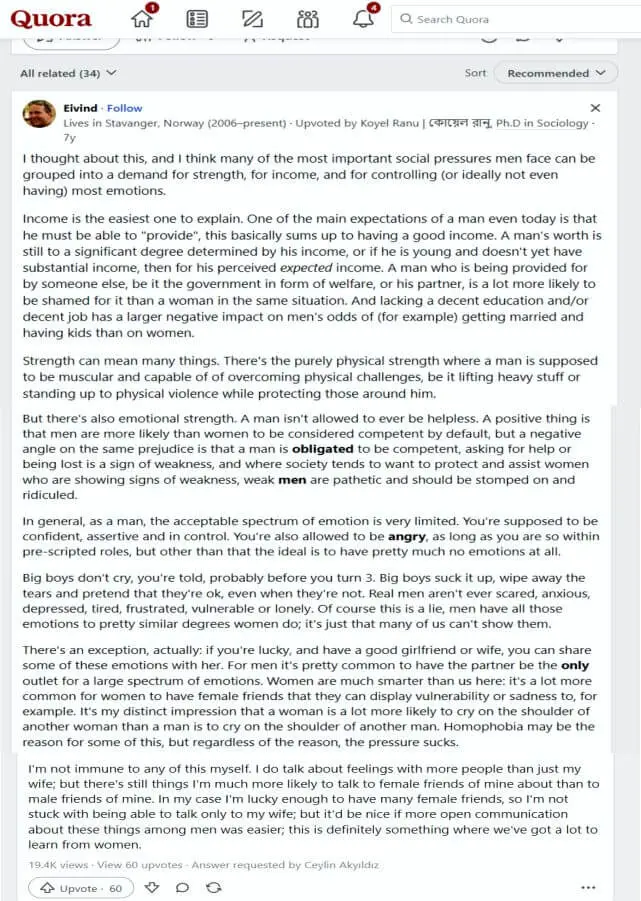Last updated on June 2nd, 2024 at 12:11 pm
Men were humans before being men. Projecting the stoic, hard exterior of manliness does not do as much as healthy or positive masculinity can. Here’s why?
As a man, how do you express masculinity so it does not hurt people? Healthy and positive masculinity makes you humane and agreeable with others.
Men have hurt themselves and others in their quest to show the strength, dominance, and other capacities of a real man.
Positive masculinity is where men can find balance in their manliness.
For healthy masculinity to exist means there is negative or toxic masculinity. But before going into details about all of that, let’s quickly know what masculinity is.
Related: The Red Flags: 12 Big Signs Of Toxic Masculinity
Masculinity is the invisible rule that has been in effect since the beginning of man which gives him a template of how or not to behave.
It is the expectation you as a man and I have always aspired to fulfill so we can be truly regarded as real men.
You and I do not know when these rules were made. All we know is that we grew up trying to fit into the image irrespective of its effect on the self and society.
Read about weak masculinity.
Table of Contents
- What is Positive Masculinity?
- What Types of Social Pressures Do Men Face?
- Why is Positive Masculinity Important?
- Positive Masculinity Traits
- Examples of Positive Masculinity
- How do you Practice Healthy Masculinity?
- Healthy Masculinity
- What is Considered Healthy Masculinity?
- Masculine and Femininity Balance
- What are the Traits of Healthy Masculinity?
- What Does Healthy Masculinity Look Like?
- How Do You Build or Develop Healthy Masculinity?
- How to Promote Healthy Masculinity
- Conclusion
What is Positive Masculinity?

Positive manliness is synonymous with healthy masculinity which is overcoming the pressures of societal expectations of being a real man.
It is being authentic as a human before becoming a man.
The masculine stereotypes force the boy and man to conform to certain values which could be against their natural wiring.
Though it’s not a bad thing to be masculine and has most of the masculine qualities like strength, resilience, protection, and all of that, it is absolutely in bad taste to use these qualities to put others at a disadvantage.
It is very tempting to use masculinity to hurt others, especially women and even yourself.
For instance, many a man has been killed because they refused to give up on a fight. Some men have been shot because they want to wrestle a gun from an intruder.
Others have been stabbed because they feel running away from a man wielding a dagger is a weakness.
Positive masculinity is being emotionally intelligent and being conscious of when our behaviours are becoming toxic, dangerous, and might harm us.
It is embracing human nature and expressing all necessary emotions and feelings without feeling emasculated.
Yes! You as a man can cry, be vulnerable, and show weakness because you are not a statue of stone that does not feel or care.
You should have this heads-up that: suppressing your emotions can be detrimental to your mental and physical health.
This is because, bottled-up emotions must find a way to express themselves either through crying, anger, or inwardly causing digestive disorders and mental issues.
Embracing the unending range of emotions and managing them is the key to positive masculinity.
This would foster the honing of men who would live entirely away from toxic and fragile masculinity.
What Types of Social Pressures Do Men Face?
Men face a hell of social pressures that make them toxic and move away from practicing healthy or positive masculinity.
This question was asked six years ago on Quora and below is one striking answer that was given by a user, Eivind.

Why is Positive Masculinity Important?
Toxic masculinity’s opposite is positive masculinity. Its goal is to teach future generations of men healthy habits so they can build stronger communities.
It involves exhibiting openness, emotional intelligence, and moral courage which should be passed down through generations.
The success of humanity is very much dependent on masculinity and having men who practice toxic masculinity instead of positive manliness would ruin the chances of humanity.
Being positive with masculinity promotes harmony, respect, and cooperation and gives everyone including animals a yearned sense of belonging.

Positive Masculinity Traits
There are ranges of traits that are peculiar to healthy masculinity. The following are some of them:
- Empathy
- Emotional and social intelligence
- Self-awareness
- Relationship management
- Expression of emotions
- Tolerance
Examples of Positive Masculinity
- The realization that you can be strong and also be kind. Using your strength for positive things
- Being a great and available dad and husband
- Processing and being in control of your negative feelings
- Having such a strong sense of self-assurance and self-belief that you are comfortable engaging in behaviors that are viewed as non-masculine
- Being protective but giving people you protect enough freedom to discover themselves
- Treating women (and nonbinary persons) with the same respect you show males should be your priority because everyone deserves to be treated with decency and respect
- Realize that seeking treatment and assistance does not diminish your manhood
- Realizing that force need not be tangible. For instance, you may calm someone down if you saw them berating someone else instead of getting on their level and shouting
- Showing your love for the people you care about
- just being conscious of how your actions affect people around you, reflecting on those actions, seeking to change, and communicating
- Positive masculinity encourages others to reach their full potential. You can achieve your goals, and you already have all you need to do so, according to this
How do you Practice Healthy Masculinity?

Positive masculinity should be the default behaviour of men if not for the stereotype of masculinity. But however, it can be learned quickly because the traits are already there lying fallow.
They should be put to use, the key is constant practice. Here are ways to practice positive masculinity.
1. Communicate Effectively and Seek Help
Communication is not just checking on people and having conversations.
Communication here means communicating your worries and challenges and probably asking for help if there is a need.
Accepting help does not make you less of a man or less self-reliant. Whether in business or at home; showing you need help demonstrates humility, openness, sincerity, and healthy masculinity.
Study has shown that men who seek help in addition to exercising, meditation, and other mental exercises are twice likely to experience balance in their lives.
2. Associate with Others
Maintaining frequent touch with people who care about you like family and friends enhances positive masculinity.
The healthy association helps you as a man to crawl out of your masculine cave and enjoy the warmth the environment can offer.
I have always observed that when I meet friends in different places, I have a light mood that can go on for days.
When this is done often, we find that we can freely communicate our bottled-up emotions and relieve stress.
3. Be Vulnerable Sometimes
I added ‘sometimes’ because I know it won’t be right to be vulnerable all the time.
I mean, there are times you don’t have to let out your weakness if it is going to jeopardize your chances at something.
However, vulnerability is where some men I know would draw the line. Most men don’t want to hear the word ‘vulnerable’ in describing a man.
We men, see it as taboo for a man to show any kind of vulnerability, instead, he would prefer to suffer in silence than show any sign of weakness.
But we are humans, not superhumans and so we have limits, no matter how we view it with our masculine minds. We get tired, break down and feel pain.
These are beyond our control and so being ashamed of expressing that we are humans is in bad taste.
The idea that being emotionally indifferent is a sign of strength frequently contributes to dangerous masculinity.
But according to experts, the secret to healthy, positive masculinity is expressing our emotions rather than holding them in. Forget ‘man up’ – let’s ‘open up’.
Related: 5 Reasons Why Women Prefer Beta Males As Partners
4. Show Empathy
Men can be self-assured, ambitious, and competitive, but they also need to have empathy, compassion, kindness, and respect.
According to science, guys who are empathic, sensitive, and emotionally stable are more confident than men who are self-critical and uphold stereotypical male behavior.
5. Show Accountability
Being accountable shows responsibility, which is a strong trait of positive masculinity. Accountability reinforces trust and builds respect both when you are a leader or subordinate.
Taking criticism and not being afraid to admit failure is as healthy as it is positive for masculinity.
Listen, learn, apologize, and grow in positive masculinity.
6. Care for your Mental Well-being
Your mental well-being is the hub of your overall health and expression of positive masculinity.
With poor mental health, you are easily overwhelmed by stress and irritability which in turn influence your behaviours and reactions to issues.
Positive masculinity has more to do with emotions and behaviours which are influenced by the mind.
Get enough sleep, eat healthily, and keep positive people around you.
7. Wealth, Power, and Status are not Enough
Some men feel that wealth, power, and status are all they need to be real men. In a world where affluence is put above morality and health, masculinity is liable to abuse and derailment.
Care, love, and empathy are needed also by the man to be a success as well.
For instance, active dads should show care for their kids and the entire family with their presence and not replace this with money. This improves the family’s well-being.
8. Have a Sense of Humour
Humour is always on the side of positivity. You can never go wrong with humour. Laughing frequently can ameliorate pain and keeps negative emotions at bay.
Among the many physical advantages of laughing include improved heart health, increased pain tolerance, increased immunity, and better sleep.
Some men, especially young men are so obsessed with their image of being a real man that they go beyond the mark to hurt others to appear strong or manly.
Inasmuch, as it’s good to be manly and do all the hard stuff, doing that at the expense of others’ happiness or comfort, is harmful masculinity and it’s in excessively bad taste.
You found this article because you are seeking information about healthy masculinity.
Continue reading to know all it entails to develop, improve and express healthy masculinity while doing away with toxic and fragile masculinity for the good of all.
Related: Habits that will Diminish Your Masculine Energy
Healthy Masculinity
Men can be emotionally expressive, have female friends or mentors, and express their emotions without feeling emasculated, according to the concept of healthy or positive masculinity.

Healthy masculinity is to be confident enough to express emotions, tolerate femininity, and have a balance between your masculine and feminine energies.
All humans have both masculine and feminine traits irrespective of gender. These traits can be learned and expressed and can also be unlearned.
Having a finger on the pulse of your behaviour around people and being conscious of how you assert your masculinity is the first step to healthy masculinity.
Some young men think that being masculine is all about showing off muscles, and beards and going hard on people they are stronger than, including women.
They go all the way to push to have all that they want because they have the strength and energy.
But in the course of doing this, they step on their toes, hurt others, and even get hurt too.
Displaying healthy masculinity requires that you are emotionally intelligent and can empathize with others.
It means your actions are not instinctive, but thoroughly thought out and executed with proper conviction, especially so that it is agreeable with others.
What is Considered Healthy Masculinity?
Healthy masculinity also means asking for people’s consent and respecting others’ physical, sexual, and emotional boundaries without getting emotionally bruised.
A lot of men have their egos bruised when they are turned down or denied what they ask.
Instead of getting hurt and fuming like fragile masculinity, or forcing its way with its strength, healthy masculinity understands that he’s not entitled to people’s loyalty and worship. He smiles and moves on.
Overcoming insecurities and impacting positively on people and the most negligible of things, including the environment, and resisting self-serving impulses are healthy masculinity.
Healthy masculinity also holds other men accountable for their behaviours while giving support where necessary in personal development.

Masculine and Femininity Balance
Masculinity and femininity stretch into each other and are normal. Men have feminine traits as much as they have masculine traits, but they suppress these soft traits early on in life.
The key is balance and being deliberate in what you believe and the actions you take.
Instead of letting stereotypical masculinity be the decider for you and how you go about your being a man, you should rather be driven by making others comfortable.
Masculinity is very challenging. It is difficult for a man in competition with women not to employ his toxicity or abusive side to dominate.
But the world is changing and the measure of strength is moving away from physical to mental.
Many men struggle with careers with women measuring head-to-head with them. Having to deal with this without being toxic is tolerance, giving everyone a level playing ground to develop.
Also Read: The Rise Of The Beta Male: Embracing Authentic Masculinity
Brute force, dominance, and negative assertion of masculinity a dying norm.
If at all a man has to dominate, his true ability to inspire and dominate should not be about his physical strength, it should be about his tenderness, purpose, service, and compassion.
This is how to impress and win the fight against toxic and fragile masculinity.
Healthy masculinity has evolved to be self-aware, and socially intelligent to be the real man whereas toxic masculinity is young and only seeks validation.
Being vulnerable, seeking help, tolerating the opinions and boundaries of others; and being masculine where and when necessary is the balance every man should seek.
What are the Traits of Healthy Masculinity?

Men want to be seen as real men – masculine and strong but it takes healthy masculinity to know how to be masculine without hurting others and themselves.
Below are the traits of healthy masculinity.
1. Healthy Masculinity is Grounded
Healthy masculinity is sensible, reasonable, and understanding the ordinary things in life.
It understands that it does not have to be lofty, psychedelic, or flaunt strength or wealth to be loved.
His respect and admiration are organic because he earned them. Being grounded also means he cannot be wavered by situations or inducements. He strongly believes in himself and is resistant to bad influence.
As a man, being grounded also gives you an allowance to express your feminine part. You understand and tolerate the femininity in people and do not make mountains out of the molehills of life.
2. Healthy Masculinity is Confident
Insecurity is one of the leading causes of toxic and fragile masculinity which is not fit for the modern man.
On the other hand, confidence will make a man approach situations with respect and empathy.
Healthy masculinity is not threatened, not battered when it fails, and not emasculated when it expresses vulnerability.
The man is human and not a rigid stoic being who does not feel pain. So feeling pain and expressing the same is being human.
3. Healthy Masculinity is not Ashamed to Seek Help When Necessary
A confident man knows he does not have all the answers. He knows where to draw the line and when to seek help.
His masculinity is so healthy that he can seek help without being ashamed or emasculated.
He understands the danger in hiding his predicaments and the consequent worsening of the situation in the case of health issues.
4. Healthy Masculinity is not Rigid in its Leadership
When playing leadership roles and in charge of a situation, healthy masculinity knows what he wants and exerts the same with respect and love.
He accommodates other people’s opinions and goes with the best. And if his opinion is the most superior, he asserts it most respectfully without being obtrusive or domineering.
Healthy masculinity is flexible enough to let others have the floor to feel among and work as a team.
It does not subjugate or discriminate against his wife or women for that matter to show he is a man.
As a man, if you have to push others to the wall or disrespect people because you have an edge over them, you are being toxic and not agreeable to modern society.
Unless you need to defend yourself from an attack, there is no need to exert your masculine power to make others uncomfortable.
5. Healthy Masculinity is Ruled by Integrity
One of the shortest routes to gaining the respect and trust of people as a man is to match your words with actions.
Healthy masculinity takes responsibility for his deeds and does not try to disown his mistakes.
He does not feel awkward or less of a man when he apologizes. Integrity is earned over time.
A man who shows transparency, where others have been dubious, would quickly earn the respect of people.
It is sad that in the world of today, more people see smartness as being able to scam and deceive people.
A real man protects the interests of others and can even sacrifice his comfort for others. That’s the sense of responsibility and sacrifice.
6. A Confident Man is not Ashamed to Show Vulnerability
A lot of men learn right from childhood not to show vulnerability. They believe that weakness is only reserved for femininity and men who are emasculated.
As wrong as this notion is, men are not some rocky statues without feelings and pain.
Men have emotions, cry and die. As a man, if you are overwhelmed by a situation, own up and seek help if necessary, instead of dying silently.
Many men have died while exerting masculinity because they feel giving up or taking a rest would mean they are weak.
7. Healthy Masculinity is not Afraid to be Wrong
I know of men who can never be wrong or accept wrongdoing. They believe it’s a sign of defeat and weakness when they accept they are wrong.
This is a clear sign of fragile masculinity. It hurts the ego of the fragile man to be reprimanded or to show remorse when he makes a mistake.
Healthy masculinity has evolved past this stage of life and instead finds strength in being wrong. This helps him build strong and healthy connections with people.
People are likely to trust you when you accept your vulnerability as it makes you more humane and approachable.
However, striving to get it right is not a bad thing as this is the desire of everyone. But we are humans and so fail most times.
Leaning into this failure and identifying with it is a good and healthy way to get it right the next time.
Related: The Power In Female And Male Submission
What Does Healthy Masculinity Look Like?

Healthy masculinity extends well beyond the narrow range of characteristics that society or a specific political or religious ideology may dictate.
It is particular to each person and might include traits like:
- Humility
- Empathy
- Vulnerability
- Emotional intelligence
- Social Intelligence
- Integrity
- Accountability
These traits seem to directly contradict conventional masculine gender norms.
Without disguising their own selves or their feelings, “genuine men” allow themselves to experience the whole range of life’s emotions.
How Do You Build or Develop Healthy Masculinity?

Building healthy masculinity should start from childhood to imbue confidence while avoiding harmful or toxic masculine expectations like – men don’t cry, men suppress emotions, etc.
However, adults can also unlearn toxic masculinity and build healthy masculinity by doing the following:
1. Respect Others
Since healthy, toxic, and fragile masculinity is mostly about how we relate with others.
We should learn to respect other people’s spaces and opinions. We should be able to read the room and act accordingly.
2. Snap out of Your Insecurities and Build Confidence
Being insecure is a lack of confidence in self. Enhancing one’s self-confidence may be accomplished by practicing good hygiene, dressing appropriately, eating healthily, and exercising.
You’re considerably more likely to feel better about yourself when you’re tidy, healthy, and well-groomed. Healthy hormones will be increased through exercise and a balanced diet, which will improve your sense of worth.
3. Know Your Strength and Weaknesses and Improve Accordingly
Let the present moment be your new beginning point for being more honest with yourself and others rather than dwelling on regrets over previous actions.
Find out what causes your male identity insecurity and learn healthy strategies to deal with such situations instead of automatically resorting to overly aggressive displays of masculinity.
4. Don’t Bottle up Your Emotions, Open up
Having your insecurities and fears expressed is the first step to having them solved. Keeping mum because you don’t know how people would see the idea is being unfair to yourself.
There would be a kind of relief you experience when you share your thoughts with others, irrespective of whether they welcome it or not.
Start by talking to those you can rely on and who will always be there for you. You can have the courage to start speaking your truth to others once you realize that even one or two people accept you for who you really are.
5. Pay Attention, Listen, and Learn
Listen to others who have been in your situation. They might have a lot you can learn when you ask and pay attention to them.
Learning from others who have overcome the same situation as yours is a good trait to keep handy.
Also, you can help others grow in their healthy masculinity by listening and giving your advice on your own experience.
How to Promote Healthy Masculinity
- Display a wide spectrum of positive emotions. It’s particularly crucial that boys watch you show a range of emotions, such as grief, loss, frustration, excitement, and happiness.
- Acknowledge and express your own emotions. Giving a reason for your response, such as “I’m sobbing because I’m sad and disturbed,” “I feel annoyed because I can’t locate my book,” or “This rainstorm worries me,” makes it easier for kids to comprehend.
- Talk about gender stereotypes and the effects they have. Boys should be told that not talking about their feelings can lead to depression and that not talking about why they are angry or unhappy can result in violence.
- Distinguish between moral strength and physical strength. Boys need to know that expressing one’s feelings and emotions is highly beneficial and that strength includes both physical prowess and virtues like kindness, gentleness, and respect.
- Promote and honor individual expression. Let boys know it’s acceptable to adopt actions and behaviors that are associated with any gender and to venture beyond the “man box.”
- Honor strong masculinities. Stereotypes should be avoided, compassion, empathy, and peaceful relationships should be encouraged, and males should be given the confidence to be themselves.
- Instead of using punishment, think about using constructive discipline. Using physical or punitive means to control a child’s behavior results in poor role modeling and underdeveloped social skills.
- To win a child’s cooperation, think about more constructive options including rational penalties, rewarding positive behaviors, and encouraging forgiveness of wrongdoings.
- Mention consent to boys and model it. Ask permission to borrow a toy or wait to give your buddy a hug before talking about consent in general terms. In later years, discuss consent as the cornerstone of healthy and respectful interactions.
- Help boys comprehend the multiplicity of sexual orientations. Teach males that some young individuals don’t want to identify as a boy or girl, that some girls are attracted to other girls, and that some boys grow up to be attracted to other guys.
- Mention gender equality to boys. Help them understand what an ally is, the necessity of becoming one, and the benefit of speaking out against discrimination based on one’s gender, race, sexual orientation, or gender identity.
Conclusion
Positive and healthy masculinities are a necessary replacement for toxic and fragile masculinities which harm more than they build and put the man in a precarious situation.
The modern man is a confident person who is not ashamed to be vulnerable and use his strength and other masculine qualities when necessary, and not use them to dominate, intimidate and hurt others or himself.
Developing the traits of healthy and positive masculinity should be the priority of every man so he can pass these on to his offspring for a healthy community.
Frequently Asked Questions About Healthy Masculinity
Q: What is healthy masculinity?
A: Healthy masculinity refers to a way of expressing masculine traits and behaviors that are positive, respectful, and non-toxic. It involves embracing traits like emotional vulnerability, empathy, and self-awareness, and rejecting harmful attitudes like aggression, dominance, and emotional suppression.
Q: How is healthy masculinity different from toxic masculinity?
A: Toxic masculinity refers to a set of attitudes and behaviors that prioritize dominance, aggression, and emotional suppression as a way of asserting one’s masculinity. This can lead to harmful behaviors like violence, misogyny, and homophobia. Healthy masculinity, on the other hand, promotes positive traits like empathy, vulnerability, and self-awareness, and seeks to challenge harmful gender stereotypes.
Q: What are some examples of healthy masculinity?
A: Examples of healthy masculinity include men who are comfortable expressing their emotions, who prioritize consent and respect in their relationships, who are actively engaged in dismantling gender stereotypes and promoting gender equality, and who are supportive of others’ emotional well-being.
Q: How can we promote healthy masculinity?
A: We can promote healthy masculinity by challenging harmful gender stereotypes, encouraging emotional openness and vulnerability in men, promoting positive male role models, and fostering supportive environments where men feel comfortable expressing their emotions and seeking help when needed.
Q: Why is promoting healthy masculinity important?
A: Promoting healthy masculinity is important because it can help reduce rates of violence, aggression, and mental health issues in men, and can promote healthier and more fulfilling relationships. It can also help challenge harmful gender stereotypes and promote gender equality.
REFERENCES:
- Examples of Positive Masculinity
- Healthy Masculinity: An Essential Guide
- Explaining Healthy, Respectful Masculinity
- Promoting Healthy Masculinity Among Boys
- Why We Need To Teach Boys About Positive Masculinity
Pyo Merez (PsyD) is a distinguished adolescent and adult psychologist at the forefront of mental health advocacy.
With expertise in cognitive and developmental psychology, focusing on social relationships, cultural contexts, and individual differences, Pyo has dedicated his career to empowering adolescents and adults.
As a sought-after speaker and panelist, Pyo shares invaluable insights on issues affecting young people, contributing to a deeper understanding of mental health and well-being in today's society.


